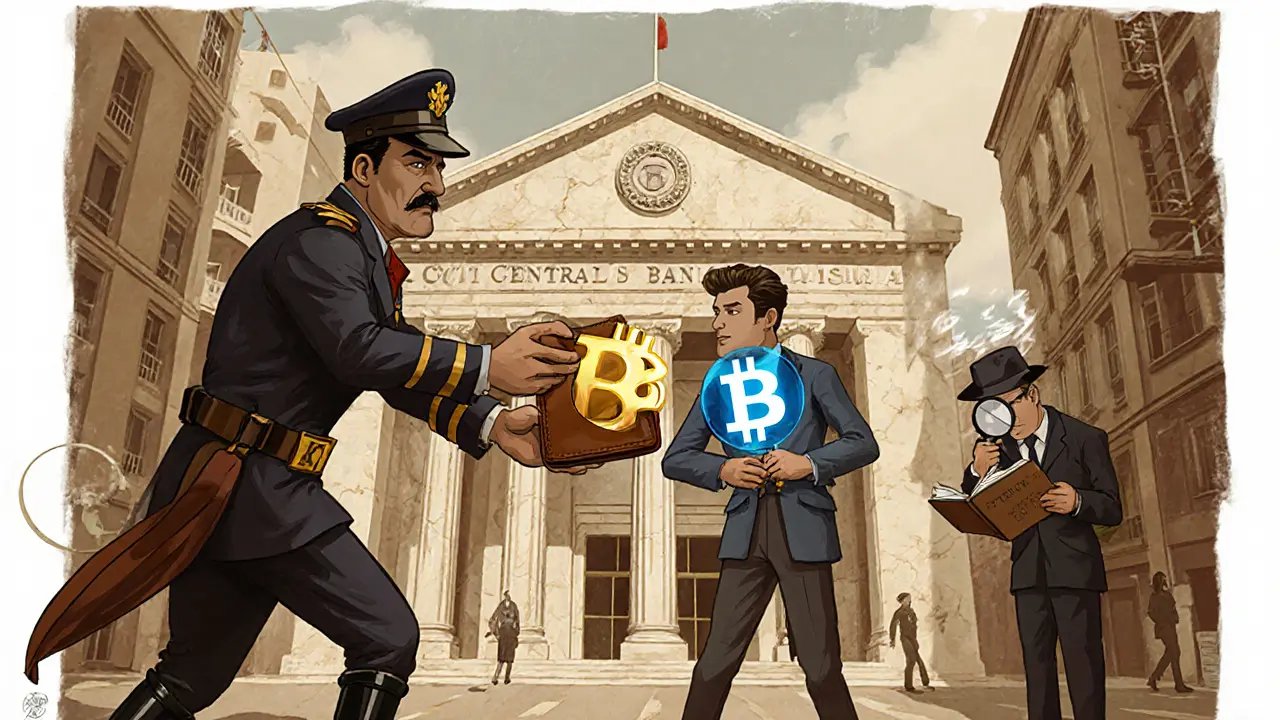Tunisia Crypto Regulations: Legal Risks for Users & Traders in 2025

Aug, 24 2025
Tunisia Crypto Penalty Calculator
This tool estimates potential penalties for crypto-related activities in Tunisia based on the Central Bank of Tunisia's 2018 regulations. All penalties are maximum values and may vary by case.
Estimated Consequences
Penalty Details
| Penalty Type | Value |
|---|---|
| Maximum Prison Term | 5 years |
| Financial Fine | $0 |
| Asset Seizure | No assets seized |
Enforcement Bodies
Risk Assessment
Low risk (but still illegal)
Tunisia cryptocurrency regulations are among the strictest in the world, banning all crypto trading, mining and payments since a 2018 directive from the Central Bank of Tunisia (BCT). This article breaks down what the law covers, who enforces it, the penalties you could face, and how a few sandbox projects manage to stay inside the legal grey area.
What the law actually says
The 2018 BCT directive classifies any unauthorized virtual‑money transaction as a criminal act. It covers three main areas:
- Buying, selling, or exchanging crypto for Tunisian dinar.
- Using crypto to pay for goods or services.
- Mining or operating any hardware that creates crypto assets.
There are no exceptions for "utility" or "security" tokens - everything falls under the same prohibition. The law is reinforced by the country’s currency‑control code, which gives authorities the power to seize assets and imprison offenders for up to five years.
Who enforces the ban?
The regime is policed by three overlapping bodies:
- Central Bank of Tunisia (BCT) - issues the 2018 directive and controls all monetary policy. It also runs the limited fintech sandbox.
- Financial Market Council (CMF) - the capital‑markets watchdog that would approve any future security‑token prospectus.
- National Anti‑Money‑Laundering Commission (CTAF) - monitors banks and financial institutions for suspicious crypto‑related transactions.
Customs officers can stop ASIC rigs at the border, banks must refuse crypto‑related transfers, and all financial institutions are obliged to file Suspicious Transaction Reports (STRs) with the CTAF.
Prohibited activities in practice
Here’s what everyday users and traders run into:
- Payments: Merchants cannot accept Bitcoin, Ether or any other digital token. Accepting crypto even in a private transaction can be deemed a violation.
- Trading: No licensed exchanges exist in Tunisia. Using offshore platforms is illegal and can trigger bank account freezes.
- Mining: Importing mining rigs is a criminal offense. The customs service regularly seizes equipment found in cargo.
- Initial Coin Offerings (ICOs): Public token sales are forbidden. Only closed‑loop pilots in the sandbox can test a token, and they must stay off‑shore for any real‑world trading.

Penalties you could face
| Offense | Maximum Prison Term | Financial Fine | Asset Seizure |
|---|---|---|---|
| Unauthorized trading or exchange operation | 5 years | Up to 200,000 TND | All crypto holdings |
| Mining equipment import | 5 years | Up to 150,000 TND | ASIC rigs, related hardware |
| Crypto‑based payments | 5 years | Up to 100,000 TND | Funds transferred via crypto |
| Facilitating ICOs or token sales | 5 years | Up to 250,000 TND | Raised funds and token contracts |
Beyond jail time, any profit generated from illegal crypto activity is automatically confiscated, and companies cannot record crypto assets on their local accounting books, creating a massive compliance headache.
Sandbox exceptions - a tiny legal window
Even in a prohibitive environment, the BCT runs a limited regulatory sandbox for permissioned blockchain projects. The sandbox runs for six to twelve months, caps transaction volume, and only allows closed‑loop pilots. Examples that have secured sandbox approval include:
- VFunder - a creative crowdfunding platform that stores data on a permissioned ledger.
- Hydro E‑Blocks - tracks carbon credits using a private blockchain.
- No Phobos - generates AI‑created NFTs but hosts the actual minting servers abroad.
These projects usually keep their infrastructure outside Tunisia to avoid seizure, while the on‑shore component remains a proof‑of‑concept.
What this means for everyday users and traders
If you hold Bitcoin in a personal wallet, you are already at risk. Authorities can request data from foreign exchanges, and Tunisian banks will freeze any account that shows crypto‑related transfers. Peer‑to‑peer trades conducted over encrypted messengers are still illegal and can lead to:
- Criminal investigation by the CTAF.
- Customs raids on homes suspected of housing mining rigs.
- Prosecution under the currency‑control code with up to five years behind bars.
Because crypto is not classified as property or currency for tax purposes, the state does not even attempt to tax it - instead, it treats any discovered holdings as illicit assets.

Risk‑mitigation tips (if you choose to stay in the market)
- Stay offshore: Use foreign exchanges that do not require Tunisian banking details. Transfer funds only through non‑bank channels (e.g., peer‑to‑peer crypto swaps) and keep them in hardware wallets.
- Use VPNs: Mask your IP address when accessing crypto platforms to reduce the chance of local surveillance.
- Avoid converting to dinar: Converting crypto to TND is the most obvious trigger for bank reporting.
- Do not import mining gear: Customs inspections are frequent, and a seized ASIC can lead to criminal charges.
- Consult a local lawyer: Most legal professionals will advise complete avoidance, but if you must engage, a qualified attorney can help you navigate the 2018 directive and draft a compliance plan.
These steps do not guarantee safety - they merely reduce the probability of detection.
Future outlook - will the ban loosen?
There are early signs of a possible shift. Parliament has discussed classifying crypto as “virtual assets” subject to FATF travel‑rule licensing. The BCT’s Digital Tunisia 2025 project includes an e‑Dinar proof‑of‑concept, though it remains a state‑run token, not a public crypto.
If the sandbox program expands, we could see more permissioned‑ledger use cases for supply‑chain transparency, but open‑market trading is unlikely to be permitted in the near term. Regional neighbors such as Morocco are adopting more permissive stances, which could pressure Tunisian policymakers to reconsider the harsh penalties that currently drive talent overseas.
Bottom line
For Tunisian crypto users and traders, the legal environment in 2025 is high‑risk. The combination of an outright ban, heavy penalties, and active customs and banking enforcement means that any involvement outside the sandbox can land you in court. The safest path is to avoid local crypto activity altogether or to operate entirely offshore while accepting the legal gray area.
Is owning Bitcoin illegal in Tunisia?
Yes. The 2018 BCT directive criminalizes any unauthorized virtual‑money transaction, which includes holding Bitcoin in a personal wallet.
Can I mine cryptocurrency from home?
No. Importing mining hardware is a criminal offense, and customs can seize the equipment. Operating a miner without imported hardware still falls under the ban.
What are the possible prison sentences for crypto violations?
The law allows up to five years imprisonment for any breach, whether it’s trading, mining, payments, or running an illicit exchange.
Are there any legal ways to use blockchain in Tunisia?
Yes, but only through the BCT’s regulatory sandbox. Projects must be permissioned, limited in scope, and typically host infrastructure abroad.
What should I do if I’m already holding crypto?
Consider moving the assets to a secure offshore wallet, avoid any conversion to Tunisian dinar, and seek advice from a qualified attorney who understands the 2018 directive.